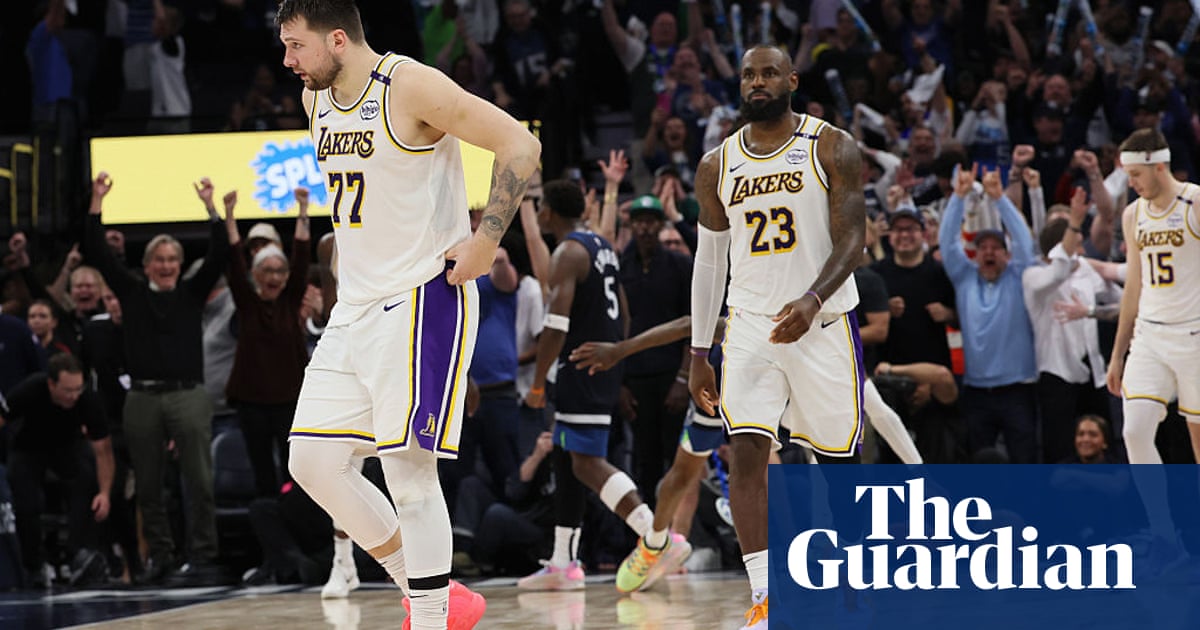Dorian Finney-Smith slams his hand in frustration against an empty chair on his way to the shower. The locker room is so silent you could hear a pin drop. In spite of every expert prediction, it was not “Lakers in five,” or, at least, not on therightend of five. The LeBron James, Luka Dončić, and JJ Redick-led Lakerswere sent packingby the Minnesota Timberwolves on their home court in Los Angeles on Wednesday, in a five-game series whose final tally doesn’t tell the whole story.
Minnesota were decidedly the better team in the series, but with the exception of a decisive Timberwolves win in the opener, it was a sequence of games won on the margins. The final game between the two teams felt, for the most part, like a competition where neither opponent particularly felt like giving their all, which played into Minnesota’s hands as the roster with far more depth and, thus, margin for error. But, in all likelihood, the serieswas won and lost in Game 4, a classic, hard-fought battle that came down to the final buzzer. While it wasn’t technically the end of the series, it’s the kind of loss that’s almost impossible to come back from, both emotionally, and historically: teams who go up three games to one in a seven-game series go on to win 95% of the time.
Those margins were, in large part, decided by the glaring holes in the Lakers’ roster construction that were illuminated in fluorescent light by the Timberwolves’ massive frontcourt. In short (as it were): the Lakers are not big enough, they were demolished on the boards by a Minnesota team who have size in spades. The small-ball-by-necessity style that secured the Lakers the three seed in a stacked West proved to be not quite resilient enough for a postseason that’s determined by depth and matchups more than ever. Los Angeles learned the hard way that a roster without a center making more than the league minimum can only take you so far, even on a team with the high-end talent of Dončić and James.
There was also, of course, the head coach factor. JJ Redick was damned impressive through 82 games and showed plenty of promise in his first season coaching basketball above the youth level, especially considering all the roster upheaval and, it’s worth noting, the fact that helost his home in the Pacific Palisades firein January. But the playoffs are a different animal, and Timberwolves head coach Chris Finch looked every bit the veteran opposite Redick, a contrast that was notable on multiple occasions throughout the series.
Perhaps the clearest example of Redick’s learning curve, and undoubtedly the one that will keep him awake at night this summer, was his decision to ride with his most successful five-man lineup of James, Dončić, Finney-Smith, Austin Reaves and Rui Hachimura forall 24 minutesof the second half of Game 4 – the first time anyNBAhead coach has done so in the playoffs in the tracking era. While not having much faith in his bench, which proved to be even thinner than many thought heading into the playoffs, resulted in an understandable gamble, it did not pay off: the quintet clearly had run out of gas by crunchtime, scoring only 19 points combined in the fourth quarter. That fatigue very well may have contributed to the Game 4 loss that effectively cost the Lakers the series.
Clear coaching growing pains and glaring roster deficiencies aside, it’s ultimately extremely rare for a dramatic roster move likeswapping Anthony Davis(who, ironically, would have come in extremely handy for the Lakers in this series) for Dončić midseason, to pay dividends in its first year. James said as much in his exit interview on Wednesday night: “Anytime you make a big acquisition in the middle of the season, it’s always going to be challenging,” he said. “Not only for me, but for [Austin Reaves] and the rest of the group.”
James added that all things considered, the group came together well, and that there’s reason for optimism moving forward: “For the time we had, I thought we ended the regular season very well, to be top three in the West, and obviously, how tough the West is. I thought that was a good test for us. We had some challenges, but I think ultimately having a guy like [Dončić] is very dynamic for any franchise.”
The “Nico Harrison is somewhere smiling” memes were aplenty after a less-than-stellar (by his standards, at least) showing for Dončić, in his first postseason as a Laker, but it’s far too early to call the Dončić/James experiment a bust. There is, clearly, plenty of work to be done on both the supporting cast and Dončić’s conditioning (and defensive intensity, which was lackluster to say the least) in the offseason. And there is, of course, the question of 40-year-old James’s future: if he’ll even return to play another NBA season, let alone with the Lakers, isstill up in the air.
But assuming James does come back for at least one more campaign in LA, there is plenty of cause for optimism as to what a full offseason and training camp, a head coach with a full season of experience under his belt, and a retooled roster could do for the pairing of two of the brightest basketball minds the world has ever seen. While the Lakers’ first round-exit is undoubtedly disappointing given all the hype and expectations around them heading into April, there is still plenty of meat left on the bone.
